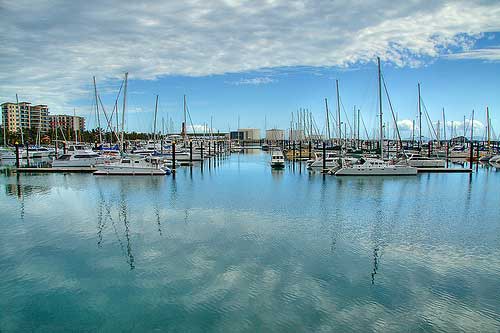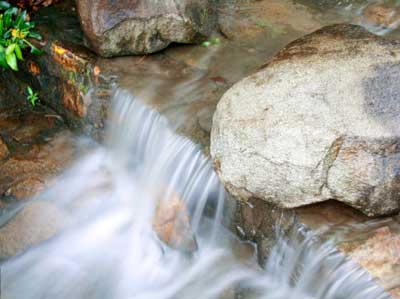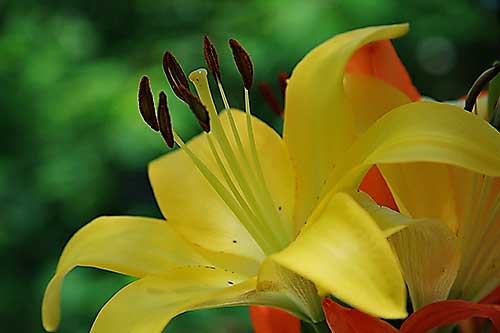Listed below are some advantages and disadvantages of the Canon EF-S 17-85mm f/4-5.6 IS USM lens, as well as numerous sample photographs taken with it.
Reasons why I often recommend this lens to fellow photographers, especially as a first purchase for those new to Canon DSLR cameras.
1. It is considered one of the best value for money, all purpose lens.
Before purchasing the lens myself, I researched close to 50 message forums and chat rooms discussing DSLR photography equipment. Rarely did I come across any photographer who didn’t like this lens.
Personally, I’ve found it to be useful in many different circumstances. For example, the ultra wide angle is perfect for landscapes. When set at 17mm focal length, you can get in much of the scenery from left to right, in one single shot. The image below was taken with a focal length of 17mm.
Another advantage of a wide angle lens, can be seen where the photographer has limited room to work with. For example, if you were photographing a person sitting in a small area, you would be able to get the whole person into the photo, yet still be positioned quite close to them as you take the shot.
This is also useful for times where you’re photographing larger objects or animals, such as horses and elephants. You don’t need to be very far away to get the whole animal into the shot.
If you’re into quirky disproportioned style of photography, the Canon EF-S 17-85mm f/4-5.6 IS USM lens is great for that as well. The photo below shows what I mean by this. I won’t go into details here, as we already have an article for this at: Big Head Photo Tips.
At the other end of the focal length, 85mm gives you a quite a bit of zoom for objects further away. I recently went on a whale watching cruise and was happy with the resulting images. Especially considering the rough conditions and the distance the whales were to the boat.
Of course, a 300mm lens would have reached further. However, as I said earlier, if you could have only one lens, the Canon EF-S 17-85mm f/4-5.6 IS USM is a great all purpose.
2. The Canon EF-S 17-85mm f/4-5.6 IS USM lens offers Image Stabilization.
One of the advantages of this, is that you can hand hold the camera at a much slower shutter speed than would otherwise have been possible. For example, I’ve found that when photographing slow motion water, it is possible to hand hold the camera for up to 2 seconds without any sign of camera shake.
Take the image below for instance where I hand held the camera with a shutter speed of 2 seconds. I agree, this is extreme and normally 1/4 of a second would have been sufficient for this type of shot. The point being however, that if I can hand hold it for 2 seconds, then 1/4 of a second where needed, is easily achieved with Canon lenses that offer Image Stabilization.
Another advantage of the Canon EF-S 17-85mm f/4-5.6 IS USM lens, is that the image stabilization option can be turned either on or off. If you have your SLR camera sitting on a tripod and intend to use a remote release for example, then it’s easy to to turn off image stabilization. Turning off image stabilization when it’s not needed, will result in sharper photo’s. We talk more about this in another article: When to use vibration reduction and image stabilization.
3. Furthermore, the Canon EF-S 17-85mm f/4-5.6 IS USM is a real USM Lens.
What this means, is that it will focus quicker than a non USM. This is useful for times when you’re capturing a moving object like a bird in flight, or a child on the run.
4. It’s also a reasonable size and weight.
Actually it’s quite small and light to carry, compared to many other Canon lenses. You could easily carry this one around all day and not tire.
Disadvantages of Canon EF-S 17-85mm f/4-5.6 IS USM lens
If there were to be a disadvantage of this lens, it would have to be the fact that it’s not too easy to achieve a blurred background. At f/4-5.6 aperture, you do need to be close to the subject with your lens zoomed out to 85mm focal length, while the objects behind it, need to be a good distance away to achieve any type of blurred background. However, once this is achieved, the blur is nice and round as you can see by the image below.
The blurred background in the image above was achieved by photographing the flowers against a tree’s branches that were seen in the distance (about 3 car lengths away). If you intend to do a lot of flower photography, and you want to single out one flower in sharp focus against a blurred background of flowers directly behind it, then I recommend using a macro lens.
Another possible disadvantage of this specific lens, is that you do need to purchase a more expensive flower style lens hood for it. With some of my other lenses, I’ve gotten away with using a cheaper no brand hood. However, due to the ultra wide angle, the hood does need those cut away pieces.




